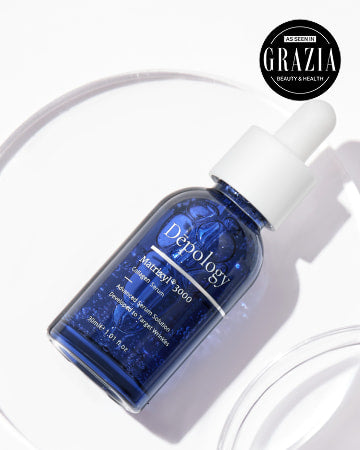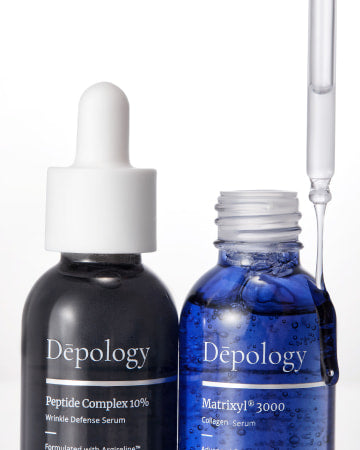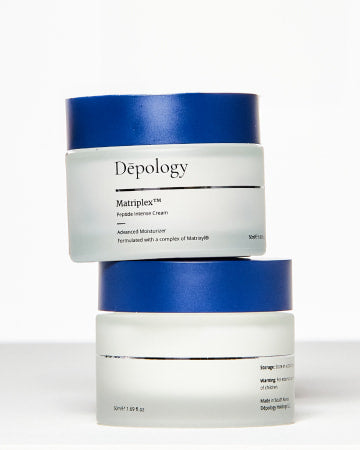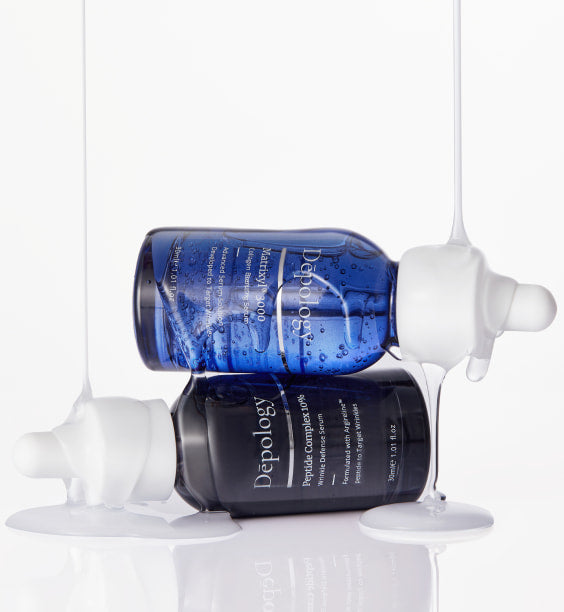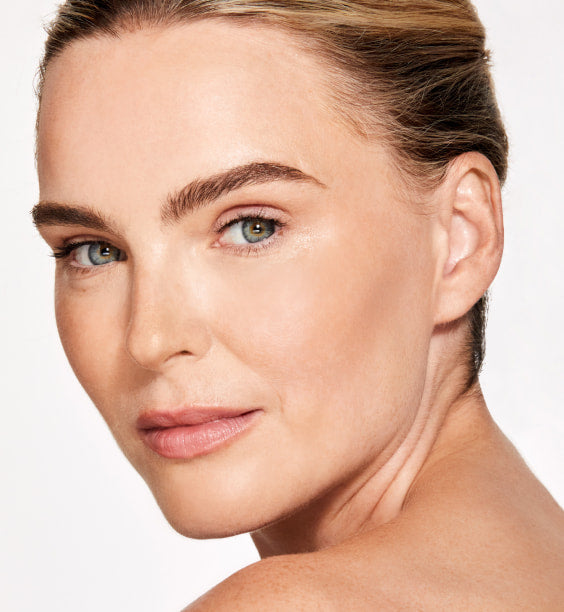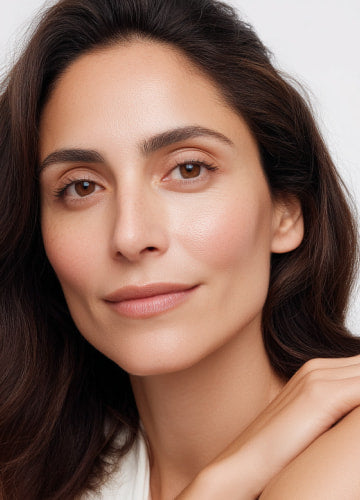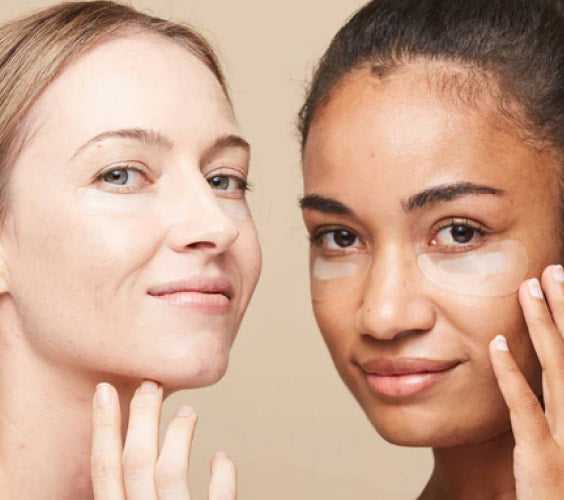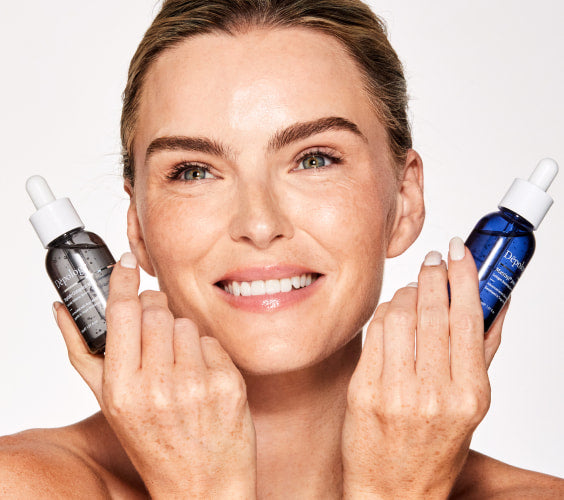
Vitamin K For Dark Circles: Does It Work?
While vitamin K may not be the first nutrient that comes to mind in your quest for radiant skin, it has been gaining attention in the industry for its potential to tackle those unwanted under-eye shadows.
Dark circles are caused by various factors, including genetics, thinning skin, and vascular issues, and Vitamin K offers a promising solution to help alleviate their appearance. If you're ready to discover a natural way to revive your under-eye area, continue below to learn how Vitamin K might be the secret ingredient your skincare routine has been lacking.
Is Vitamin K an antioxidant?
Vitamin K is generally not considered an antioxidant like vitamins C and E. Antioxidants are molecules that help protect cells from oxidative damage caused by free radicals. They do this by neutralizing free radicals and reducing their harmful effects on the body.
CTA: Power C Antioxidant Radiance Boosting Serum
Vitamin K, on the other hand, is primarily known for its role in blood clotting and bone metabolism. It plays a crucial role in the protein activation involved in these processes. While vitamin K does have a role in maintaining overall health, it does not function primarily as an antioxidant.
Some research has suggested that vitamin K may have antioxidant-like properties in certain contexts. For example, it may help protect cells from oxidative stress indirectly by supporting the health and function of certain enzymes and proteins. However, it is not considered a classical antioxidant in the same way as vitamins C and E.
What does Vitamin K do?
Vitamin K is a fat-soluble vitamin that plays a vital role in several important functions in the body. There are two primary forms of vitamin K: vitamin K1 (phylloquinone), which is found in leafy green vegetables and some other plant-based foods, and vitamin K2 (menaquinone), which is produced by bacteria in the gut and is also found in certain animal-based and fermented foods.
Here are some of the main functions of vitamin K:
Blood Clotting: Vitamin K is perhaps best known for its role in blood clotting (coagulation). It is essential for the production of several clotting factors, including prothrombin and factors VII, IX, and X. These proteins help form blood clots to prevent excessive bleeding when you have a wound or injury.
Bone Health: Vitamin K is involved in regulating calcium metabolism and bone mineralization. It helps activate a protein called osteocalcin, which is necessary for the proper deposition of calcium into bone tissue. Adequate vitamin K intake is important for maintaining healthy bones.
Cardiovascular Health: In some cases, vitamin K may have a role in promoting cardiovascular health. It can help prevent calcium from accumulating in blood vessels and soft tissues, potentially reducing the risk of arterial calcification and heart disease.
Brain and Nervous System Health: There is ongoing research into the potential role of vitamin K in brain and nervous system health. Some studies have suggested that it may be involved in neuronal function and protection against neurodegenerative diseases.
Anti-Inflammatory Effects: Vitamin K may also contain anti-inflammatory properties, which could be beneficial in various health conditions associated with inflammation.
While Vitamin K deficiency has the potential to lead to bleeding disorders and increased risk of fractures, deficiencies are relatively rare in healthy individuals, as vitamin K is found in a variety of foods and is naturally produced by gut bacteria. In cases where deficiency does occur, it can be managed through dietary supplementation or other medical interventions.
What are the benefits of Vitamin K in skincare?
Vitamin K, when incorporated into skincare products, is believed to offer several potential benefits for skin health and appearance. While scientific research on the specific skincare benefits of vitamin K is limited compared to other common skincare ingredients, here are some of the potential advantages associated with vitamin K in skincare:
Reducing the Appearance of Bruises/Redness: Being known for its role in reducing the appearance of bruises and redness caused by broken blood vessels, Vitamin K is often used in products designed to address conditions like spider veins and broken capillaries on the skin.
Improving the Appearance of Dark Circles: Some skincare products containing vitamin K are marketed as treatments for dark circles under the eyes. Vitamin K may help strengthen blood vessels and reduce the visibility of dark circles caused by vascular issues.
Minimizing Redness and Rosacea: Vitamin K's potential anti-inflammatory properties may help reduce redness and inflammation associated with conditions like rosacea. It can help soothe irritated skin and improve its overall appearance.
CTA: Cica H.A. Calm & Repair Serum
Promoting Skin Healing: Vitamin K may support the body's natural healing processes by helping to form blood clots. This can be beneficial for post-surgery or post-procedure skincare to minimize bruising and promote quicker healing.
Skin Brightening: Some users have reported that vitamin K-containing skincare products can help improve skin tone and brightness, giving the complexion a healthier and more even appearance.
CTA: Serum-infused brightening Micro Dart Patches
The efficacy of vitamin K in skincare products can vary from person to person, and not everyone will experience the same results. Additionally, the concentration of vitamin K in skincare products can vary, so it's essential to follow the manufacturer's instructions and use the product as directed.
Highly impressed by the results he saw in his patients, Dr. Noman Mohamed, a cosmetic dermatologist based in London, recommends the micro dart patches provided by Dēpology. “[They] provide excellent anti-aging and hydration benefits,” he states, with his patients experiencing “improved skin texture, tone, and radiance.”
“They are particularly useful for the under-eye area,” adds Mohamed, “an area that is notoriously challenging to treat even with injectables and is often one of the first to show signs of aging. If you’re looking for a powerful and effective skincare solution for anti-aging, give these serum-infused micro darts a try and see the difference for yourself.”
If you have specific skin concerns and are considering using skincare products containing vitamin K, it's a good idea to consult with a dermatologist or skincare professional. They can provide personalized recommendations and assess whether these products are appropriate for your particular skin condition or goals. Keep in mind that skincare is often most effective when used in conjunction with a comprehensive skincare routine that includes cleansing, moisturizing, and sun protection.
Is Vitamin K safe for those with sensitive skin?
When used in skincare products, Vitamin K is generally considered safe for those with sensitive skin. It is not known to be a highly irritating ingredient, and adverse skin reactions to vitamin K are relatively rare. However, as with any skincare product, individual sensitivities can vary, so be sure to keep the following considerations in mind:
Product Formulation: The overall formulation of a skincare product can influence how well it is tolerated by sensitive skin. Check the ingredient list for potential irritants, such as fragrances, alcohol, or harsh preservatives, which may be present in the product alongside vitamin K.
Start Slowly: If you decide to incorporate a vitamin K-containing product into your skincare routine, start by using it sparingly and gradually increase usage if your skin tolerates it well. This can help minimize the risk of irritation.
While vitamin K is generally well-tolerated, be cautious and attentive to your skin's response when trying any new skincare product, especially if you have sensitive skin. If you experience any irritation, redness, itching, or other adverse reactions, discontinue the use of the product and consult with a dermatologist for guidance on how to address the issue. They can recommend alternative products or ingredients that may be better suited to your skin's needs.
Is Vitamin K good for acne?
Vitamin K is not typically used as a treatment for acne, and its role in managing acne is not well-established. Acne is primarily caused by factors such as excess sebum production, clogged pores, inflammation, and the presence of certain bacteria on the skin, primarily Propionibacterium acnes.
This nutrient is more commonly associated with its roles in blood clotting, bone health, and other physiological processes, as mentioned earlier. While it does have some potential anti-inflammatory properties, there is limited scientific evidence to support the use of vitamin K as a standalone treatment for acne.
If you are dealing with acne, it's generally advisable to explore more established acne treatments, such as:
Topical Treatments: Over-the-counter or prescription topical treatments containing ingredients like benzoyl peroxide, salicylic acid, or topical antibiotics can help manage acne by reducing inflammation and killing acne-causing bacteria.
Oral Medications: In severe cases of acne, a healthcare provider may prescribe oral antibiotics or other medications like isotretinoin (Accutane) to address the underlying causes of acne.
Lifestyle and Skin Care: Practicing good skincare hygiene, avoiding excessive scrubbing or picking at acne lesions, as well as using non-comedogenic (non-pore-clogging) skincare products can also help improve acne.
Diet and Nutrition: While individual responses vary, some people find that certain dietary changes, such as reducing the consumption of dairy or high-glycemic foods, may help improve their acne. Maintaining a balanced diet and staying hydrated is generally recommended for overall skin health.
Does Vitamin K reduce dark circles?
Vitamin K can be used as a remedy for reducing dark circles under the eyes, but its effectiveness for this purpose isn’t well-established, and scientific evidence remains limited. Dark circles under the eyes can have various causes, including genetics, skin pigmentation, thinning skin, and vascular issues. While vitamin K may have some potential benefits for certain aspects of skin health, its role in specifically reducing dark circles is unclear.
Vitamin K is heavily involved in blood clotting and helps strengthen blood vessel walls, potentially reducing the appearance of dark circles caused by blood vessels showing through the thin skin under the eyes. Some topical creams and serums containing vitamin K are marketed as treatments for dark circles.
If you're concerned about dark circles under your eyes, here are some additional tips that may help:
Get Adequate Sleep: Lack of sleep can contribute to the appearance of dark circles. Ensure you are getting enough restful sleep each night.
Manage Allergies: Allergies can cause under-eye puffiness and contribute to the appearance of dark circles. Managing your allergies may help alleviate this issue.
Topical Treatments: Some topical creams or serums containing ingredients like hyaluronic acid, retinol, or peptides may help improve the appearance of the skin under the eyes.
Healthy Lifestyle: Maintain a balanced diet, stay hydrated, and avoid smoking and excessive alcohol consumption, as these factors can affect skin health.
Cosmetic Procedures: In some cases, cosmetic procedures like dermal fillers or laser therapy may be recommended by a dermatologist to address persistent dark circles.
Are there side effects to using Vitamin K on the face?
When used topically in skincare products, vitamin K is generally considered safe for most people and is not associated with significant side effects. As with any skincare ingredient, some individuals may experience mild skin reactions or sensitivity.
Here are some potential side effects and considerations related to using vitamin K on the face:
Skin Irritation: In rare cases, some people may experience mild skin irritation, redness, itching, or a rash when using skincare products containing vitamin K. If you notice any of these symptoms, discontinue use immediately.
Allergic Reactions: While allergic reactions to vitamin K are uncommon, they can occur in some individuals. If you have a known allergy to vitamin K or any of the other ingredients in a skincare product, avoid using it.
Interaction with Other Skincare Products: Vitamin K-containing products should generally be safe to use with other skincare products. However, if you are using prescription medications or have specific skin concerns, it's a good idea to consult with a dermatologist to ensure no potential interactions are present.
Sun Sensitivity: Some skincare ingredients, including vitamin K, may make your skin more sensitive to the sun. It's essential to use sunscreen with adequate SPF protection when using these products, especially if you are applying them during the day.
It's important to patch-test any new skincare product, including those with vitamin K, before applying it to the facial area. To do a patch test, apply a small amount of the product to a discreet area of your skin (such as the inner forearm) and wait 24 to 48 hours to see if any adverse reactions occur.
Is Vitamin K safe during pregnancy?
Overall, vitamin K is considered safe when consumed at recommended dietary levels during pregnancy. Since Vitamin K is an essential nutrient that plays a crucial role in blood clotting and bone health, this is especially crucial for the health of both the mother and the developing fetus. During pregnancy, expectant mothers need to meet their nutritional needs to support the growth and development of the baby. Vitamin K is one of these essential nutrients.
Here are some important considerations regarding vitamin K during pregnancy:
Dietary Intake: Foods rich in vitamin K include leafy green vegetables (such as spinach, kale, and broccoli), brussels sprouts, cabbage, and certain oils. Including these foods in your diet can help ensure you get an adequate amount of vitamin K.
Supplements: In some cases, healthcare providers may recommend vitamin K supplements during pregnancy if there is a specific concern about deficiency. However, don’t take vitamin K supplements without the guidance of a healthcare professional, as excessive intake of vitamin K supplements can have adverse effects.
Prenatal Vitamins: Many prenatal vitamin supplements contain vitamin K along with other essential nutrients. These can be a convenient way to ensure you are meeting your nutritional needs during pregnancy. Be sure to follow your healthcare provider's recommendations regarding supplements.
Medical Conditions: In certain medical conditions, such as specific liver or gastrointestinal disorders, vitamin K absorption or utilization may be impaired. In such cases, healthcare providers may monitor and address vitamin K levels as needed during pregnancy.
Medications: If you are taking medications that interfere with vitamin K metabolism, your healthcare provider will carefully monitor your vitamin K status and make any necessary adjustments.
It's important to discuss your dietary habits, any concerns about vitamin intake, and any nutritional supplements with your healthcare provider during pregnancy. They can provide personalized guidance based on your specific health and dietary needs to ensure a safe and healthy pregnancy. Overall, vitamin K is an important nutrient during pregnancy, and maintaining an appropriate intake is important for both maternal and fetal health.
Conclusion
Vitamin K undoubtedly deserves a place in your skincare arsenal. While it may not be a magical ingredient, the potential benefits of vitamin K, especially when it comes to banishing dark circles, should not be underestimated. Its role in strengthening blood vessels, reducing redness, and promoting a more even skin tone can make a noticeable difference in the appearance of your under-eye area. If you've been dealing with persistent dark circles, you might discover that vitamin K will lead you to achieving a brighter, more radiant complexion.


